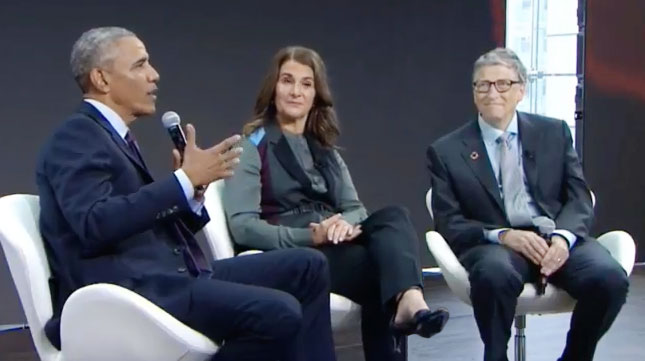
None of us can move forward if half of us are held back. So if you want a healthier, better world, you need to put women and girls at the centre of the agenda,” said Microsoft Founder Bill Gates at the Bill & Melinda Gates Foundation’s inaugural Goalkeepers event in New York last month. Former US President Barack Obama was there as also the Canadian Prime Minister Justin Trudeau, but the platform clearly belonged to women activists such as Nobel Peace laureates Malala Yousafzai and the Liberian peace activist Leymah Gbowee.
Along with Obama, they constituted three Nobel laureates at the event.
The occasion — Goalkeepers event — also marked the release of the Gates Foundation’s first annual report tracking the progress made by the United Nations’ Sustainable Development Goals (SDGs).
The report showed that in the battle against infectious diseases and poverty, areas that have totally engaged the attention of the Gates Foundation, the picture is not so gloomy as screaming social media posts or alarming media reports indicate. So concluded the report titled “Goalkeepers: The Stories Behind the Data”. It was also announced that such a report will be brought out every year till 2030.
The findings point out that while progress has been made in areas such as infant mortality, maternal health, family planning and immunisation, the objective of achieving gender equality by 2030 — a goal shared by the UN’s HeForShe campaign, requires a “more complex approach”.
When you talk to mothers who have experienced the death of a child, you understand what that number — annual deaths — means in human terms.
– Melinda Gates
Melinda Gates said that if she had to pick just one number to focus on, it would be the number of children who die every year before reaching the age of five. There was so much packed into that number. “Child mortality is a proxy for overall wellbeing; it’s also a leading indicator of progress (or the lack of it). And when you talk to mothers who have experienced the death of a child, you understand what that number means in human terms. What is more fundamental than keeping children alive so they can thrive and build the future,” she asked.
And yet, it was positive to note that this number was coming down; from 11.2 million in 1990 to 5 million in 2016.
Progress has indeed been made in several areas, the report said. For eg, over the past 25 years, HIV deaths have reduced remarkably — from a high of 0.60 deaths per 1,000 people in the late 1990s to 0.25 in 2016. But, in the report, Bill Gates expressed concern that funding has slowed down to the extent that a population boom could mean a resurgence in HIV over the coming years, and this was a “scary prospect”.

President Barack Obama was there at the event and expressed his disapproval of the Republicans’ attempts to repeal his health care reforms and inflict “real human suffering” on American citizens. Canadian Prime Minister and self-proclaimed feminist Justin Trudeau, whose popularity through the world is increasing as he is being seen as a liberal and pluralist global leader, apart from being a staunch feminist, urged the audience to “break down stereotypes that hold women back.”
But some of the most compelling voices or the showstoppers at the event were Malala and Leymah. The session, titled “Still I Rise: The Power of Women’s Movements”, was moderated by Melinda Gates, who underlined the need to invest in women leaders who are working “on the frontline”, as gender equity was necessary to achieve progress on all the issues related to health and poverty. While Malala had bravely defied the Taliban in Pakistan and taken bullets on her young body, mainly on the face, while defending and advocating the right of girls to education, Leymah is a grassroots activist who is credited with helping to end the second Liberian civil war in 2003.
Leymah galvanised the audience when she spoke about a female volunteer who had tended to the same boy soldier who had killed her own child. “It’s an example of putting love over hate for the greater good, and demonstrates why women in Liberia need to bring some sense and sensibility to the process of attaining peace.”

Addressing the meet, Malala shared her experience in fighting for the right of girls to go to school in Pakistan and observed, “If one girl with an education can change the world, what can 130 million do? They can grow economies, improve the air we breathe, cut in half the risk of violent conflicts, and advance public health. Over and over, studies show that girls are the answer to the most pressing problems.”
But the sad truth was, she noted, that none of the sustainable development goals being discussed on the occasion could be achieved “unless we educate girls. There are no straight lines and no overnight solutions to getting 130 million girls in school. This is because of barriers to girls’ education, such as poverty, war, child marriage. But I believe we can do it. I believe we can see every girl in school in my lifetime, because I believe in local activists and champions.”
Both Malala and Leymah expressed the optimism that there were many young women like them across the world who were putting in heroic efforts and great work, but they needed to be identified, supported and encouraged.
Examples were given of Ria Sharma, who supports survivors of acid attacks in India; Marieme Jamme, a Senegalese survivor of human trafficking who has gone on to teach African women and girls to code; and Laura Ulloa, who works to reintegrate former Colombian guerrillas into mainstream society.
All these women were honoured at the Goalkeepers’ Global Goals Awards dinner.





